|
|
|
Sort Order |
|
|
|
Items / Page
|
|
|
|
|
|
|
| Srl | Item |
| 1 |
ID:
132298
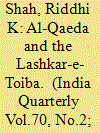

|
|
|
|
|
| Publication |
2014.
|
| Summary/Abstract |
Study of ideology is one of the most important domains of consideration for a successful counter-terrorism strategy. It is necessary to know and understand the ideology of a terrorist outfit coupled with the ongoing evolution at the same, its chief ideologues and its target audiences in order to provide an alternative ideology or in other words to win the 'hearts and the minds' of the people. This article traces the mounting similitude in the discourse and the actions of Lashkar-e-Taiba and the ideology of Al-Qaeda. The article begins with a brief depiction of the debate on the 'end of ideology' before proceeding on to an examination of Al-Qaeda's ideology. In the next section, LeT's discourse and actions from 1990 to 2010 are scrutinised followed by an analysis that attempts to draw out parallels between the ideologies of the two terrorist organisations. In the last section, the conclusion raises several pertinent points for the consideration of counter-terrorist specialists and policy makers.
|
|
|
|
|
|
|
|
|
|
|
|
|
|
|
|
| 2 |
ID:
130092
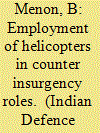

|
|
|
|
|
| Publication |
2014.
|
| Summary/Abstract |
Experts estimate that about 80 different insurgencies are active around the world. Malaya, French lndochina, Kenya, Zimbabwe, Indonesia, South Africa, Algeria, Vietnam, Afghanistan, Sri Lanka, the Congo, Syria, Lebanon, Iraq, Libya, the Balkans, Xiniiang, Myanmar, Philippines, Thailand and Chechnya have all seen the use of fixed and rotary wing aircraft in operations against insurgents in the past. Usage was limited in most cases because of the shortage of helicopters in the inventories of most military and para military forces barring perhaps the US and the Soviets, and not because their unique capabilities were not apparent.
|
|
|
|
|
|
|
|
|
|
|
|
|
|
|
|
| 3 |
ID:
132329
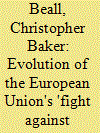

|
|
|
|
|
| Publication |
2014.
|
| Summary/Abstract |
The purpose of this article is to explore the ways in which the European Union (EU)'s counter-terrorism discourse, the 'fight against terrorism', is constructed, and the ways in which it functions both rhetorically and in practice. It argues that 'EU identity' is constituted through and is central to the constitution of EU counter-terrorism policy. The approach taken is constructivist in nature, drawing on a discourse analysis of primarily European Council policy documents, as well as the reports and speeches of the EU Counter-Terrorism Co-ordinator. In particular, it identifies three strands of the discourse that, it is argued, play a key role in the construction of a terrorist 'other'. These three strands include terrorism as crime and as an emotive act of violence; terrorism as an act perpetrated solely by non-state actors; and terrorism as a 'new' and 'evolving' threat. The article proceeds in three steps. First, it outlines the theoretical considerations that underpin this research, including its empirical application. Second, it demonstrates how each strand of the discourse is constructed. Third, it discusses the functioning of the discourse, including the contested nature of the 'terrorism knowledge' that underpins the EU's counter-terrorism approach. The article concludes by reflecting on what this case study contributes to our understanding of EU counter-terrorism policy, as well as explaining how the notion of the terrorist 'other' could provide the basis for a future research agenda that deepens our understanding of how the identity of the EU is constituted.
|
|
|
|
|
|
|
|
|
|
|
|
|
|
|
|
| 4 |
ID:
132204
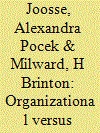

|
|
|
|
|
| Publication |
2014.
|
| Summary/Abstract |
Recent studies have taken an important first step in examining which terrorist groups, based on their organizational characteristics and the characteristics of the environment in which they operate, are more likely to pursue chemical, biological, radiological, and nuclear (CBRN) weapons. This approach, however, assumes that individuals who perpetrate events act on behalf of the organization to which they primarily belong. Using the case of Jemaah Islamiyah's alleged attempt to develop the pathogenic bacterium Bacillus anthracis, or anthrax, the authors demonstrate the importance of including individual-level variables to the analysis. In particular, the attendance by several key Jemaah Islamiyah members at an Al Qaeda-affiliated training camp is argued to set a chain of events into motion that ended in their involvement in the anthrax cultivation program.
|
|
|
|
|
|
|
|
|
|
|
|
|
|
|
|
| 5 |
ID:
132220
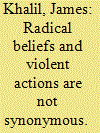

|
|
|
|
|
| Publication |
2014.
|
| Summary/Abstract |
This article develops and elaborates on three core points. First, as with research into other social science themes, it is argued that it is necessary to apply the logic of correlation and causality to the study of political violence. Second, it highlights the critical disjuncture between attitudes and behaviors. Many or most individuals who support the use of political violence remain on the sidelines, including those who sympathize with insurgents in Afghanistan (reportedly 29 percent in 2011), and those supportive of "suicide attacks" in the Palestinian Territories (reportedly reaching 66 percent in 2005). Conversely, those responsible for such behaviors are not necessarily supportive of the ostensible political aims. Third, it is argued that the motives that drive these attitudes and behaviors are often (or, some would argue, always) distinct. While the former are motivated by collective grievances, there is substantial case study evidence that the latter are commonly driven by economic (e.g., payments for the emplacement of improvised explosive devices), security-based (i.e., coercion) and sociopsychological (e.g., adventure, status, and vengeance) incentives. Thus, it is necessary for the research community to treat attitudes and behaviors as two separate, albeit interrelated, lines of inquiry
|
|
|
|
|
|
|
|
|
|
|
|
|
|
|
|
| 6 |
ID:
131986
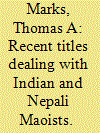

|
|
|
|
|
| Publication |
2014.
|
| Summary/Abstract |
A joint publication of the International Work Group for Indigenous Affairs (IWGIA) and Bindrai Institute for Research Study and Action (BIRSA), this treatment reads as a cross between a Zapatista manifesto and useful scholarship. It is worth quoting in full the cover blurb, because it illustrates well an approach which emerges in perhaps a majority of the works on Indian Maoism: 'The basic line of inquiry concerning the issues (dispossession from life supporting resources of land, forest, water and identity), the main cause (internal colonialism) and the remedy (provision of autonomy), has been discussed by leading social scientists and activists. In the process can be seen emerging a development critique with an alternative provided by the tribal/indegeous [sic] perspective aimed at reconstructing a society based on equality; economy based on cooperation, caring-sharing conservation, subsistence and decentralization; a policy based on conscience democracy [sic] and art based on collective participation and enjoyment.
|
|
|
|
|
|
|
|
|
|
|
|
|
|
|
|
|
|
|
|
|